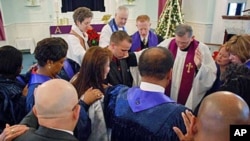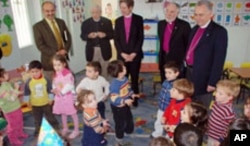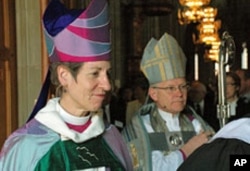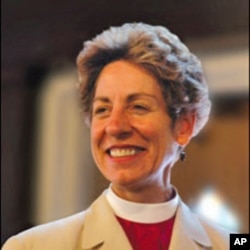It's been a busy year for Bishop Katharine Jefferts Schori.
The presiding bishop and primate of the Episcopal Church, Jefferts Schori is the first woman ever elected chief pastor of that denomination, which has over two million members in 16 countries.
In the past two weeks alone, she has travelled to the Midwest to visit a diocese, attended a conference on science and religion, adjudicated concerns at a meeting of bishops, and penned what is sure to be a closely-watched sermon dealing with the U.N. Millennium Development Goals to eliminate global poverty.
"I think it was [German theologian] Karl Barth who said, 'Preachers are supposed stand in the pulpit with a bible in one hand, and a newspaper in the other,'" says Jefferts Schori. "There has to be some connection between those ancient stories and the struggles or joys in a particular community today."
Taking a stand
Jefferts-Schori often takes liberal stands that are at odds with traditionalists within the Episcopal Church.
For example, many conservatives say that openly gay men have no place in the clergy. Jefferts Schori says biblical condemnations of homosexuality stem from an ancient cultural context that is no longer binding in our time. In fact, as a child, what she saw as the church's anti-intellectualism caused her to leave it for a time.
"The faith I received as a child was fairly mechanistic, fairly literal. That 'salvation means this' and 'Jesus did that' and so 'just believe it.' And that began to be unsatisfactory, inadequate," she says. "I needed a deeper sense of what it means to be in relationship with God."
Faith and nature
Jefferts Schori found solace in nature near her childhood homes in the Pacific Northwest and later on the East Coast. She studied biology in college and received a doctorate in oceanography with a specialty in octopuses and squids. Jefferts Schori says her love of nature ultimately brought her back to God, whom she feels created the world's endlessly varied and interconnected wonders.
"The enlightenment view is that human beings are autonomous and separate. Science, in the recent past, has taught us a great deal about how interconnected we are. It's totally false to think we are distinguishable utterly from other parts of creation. And that's both a religious and a scientific viewpoint."
For Jefferts Schori, that sense of relatedness with others, including non-human "others," leads naturally to a theology of compassion and activism. She is most concerned for the voiceless, the powerless, those, who in her words, exist "on the margins."
Combining religion and activism
"I read the gospels to say that Jesus is most passionate about those that are excluded." Jefferts Schori believes refugees, the radically poor, people of color and women fit that label. "Our attention needs to be focused more intensely on those who don't have access to the abundance of life. There is a sense that we meet the image of God in every human being. And if we assume that these people aren't really deserving to be 'within the circle,' we've missed something important about the divine."
Jefferts Schori saw hints of the divine during her five and a half years working with the dying as a hospice chaplain. She recalls a patient with a brain tumor who could speak only in metaphors. Others thought he was crazy, but Jefferts Schori engaged him in that mode and gained from the experience.
"A sense that listening more deeply recognized the communication that was going on but if you took it at the superficial level you were going to miss everything."
Unlikely journey
Jefferts Schori says her life's journey has often meant saying yes to what seemed ridiculous or impossible. Ordained to the priesthood in 1994 at the age of 40, she was shocked six years later, when a fellow priest said he wanted to nominate her for bishop.
"I just laughed. I said, 'That's totally absurd! I'm a woman. I'm too young. I haven't been head of a big congregation.' And over the next several weeks I was terrified when I thought seriously about it, but I came to realize I was a part of that process even though it made no sense at all.
Jefferts Schori was consecrated bishop of Nevada in 2001. When she was elected presiding bishop and primate of the entire Episcopal Church only six years later, she accepted the challenge of shepherding a denomination rife with controversy.
As a mother, she compares her pastoral duties with a parent's task of giving guidance while allowing children to make their own choices.
"In the church, it's about providing the boundaries and encouraging creativity within those boundaries. It's about seeking abundance for the other and giving thanks for what is."









